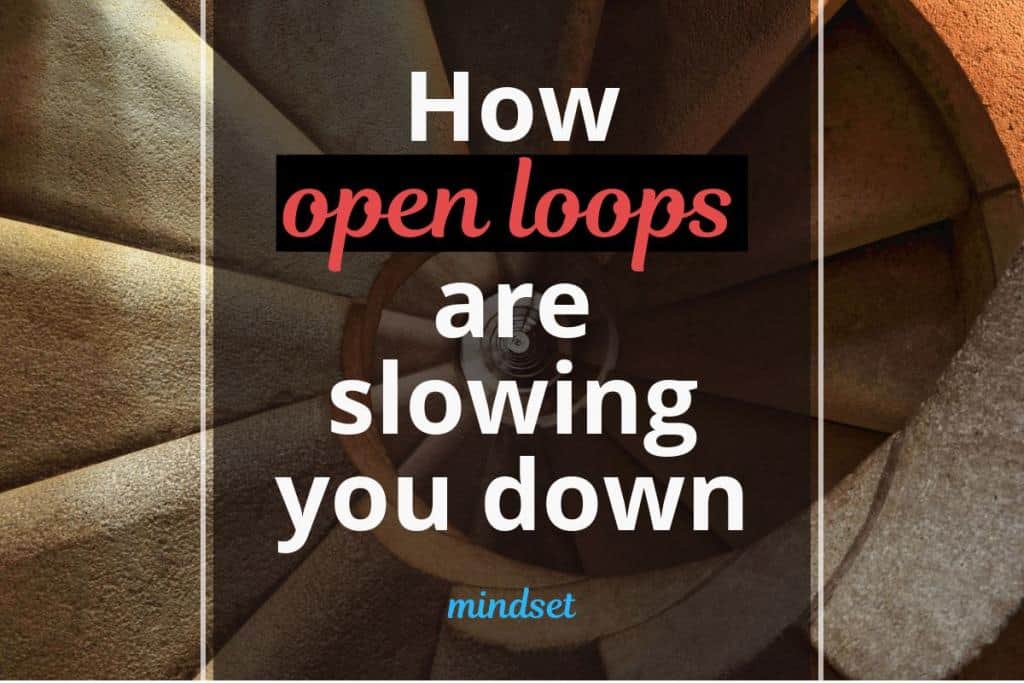🖊 This article was last updated on March 31, 2023
Do you find yourself lying awake at night thinking about all the things you didn’t get done that day and all the things you have to do the next day? Yeah, we’ve all been there. It’s like a suspense movie playing on a loop inside your head, but it never gets to the end. Instead, the suspense just keeps growing and growing. It’s exhausting!
If this sounds familiar, then you, my friend, have too many open loops in your life. It’s time to take control, learn how to recognize the open loops and what action to take to tie those bad boys off once and for all!
What is an Open Loop?
An open loop is a commitment that you made to yourself or someone else, but which hasn’t been fulfilled yet. It can be a task or a project you started but not yet finished. It can be something really small, anything that you know you have to do, may not want to, but either way, haven’t done yet.
Open loops aren’t restricted to your life as a solopreneur, they can also stem from your personal life. Relationship situations left unresolved, someone you meant to call but haven’t got around to, an awkward conversation that has to happen that you keep putting off, things you need to remember like, ‘must buy milk’… the list is endless. Quite like an open loop!
Why do Open Loops Matter?
The phenomenon of the ‘open loop’ was first discovered by psychologist and psychiatrist, Bluma Zeigarnik. She discovered what is now known as the Zeigarnik Effect (open loop), the tendency of our brain to remember and focus on incomplete tasks more than it does on completed tasks.
This unfortunate predisposition was taken further and applied to the concept of productivity by management consultant, David Allen. In his best-selling book, ‘Getting Things Done’, Allen explains that there is a direct link between our ability to switch off and relax, and our productivity. The basic message is that unless we allow ourselves proper rest, we will never reach our creative potential and we will be in danger of entrepreneurial burnout.

How do Open Loops Affect Us?
Think of open loops as open tabs in your browser. If you have too many open tabs, your browser starts to slow down and eventually crashes. This is exactly what open loops do to your brain!
Open loops can wreak havoc on our energy, our confidence, and our health. Anxiety increases, sleep decreases, productivity plummets, procrastination becomes a hiding place, and the loops still dangle before you like a hangman’s noose…
Open loops keep your brain active even when you are supposed to be taking a break, thanks to our natural obsession with unfinished business. We just can’t shut off. So, if we can’t shut off your brain, we need to close the loops.
How to Close the Loops
Think of your shoe laces— if you don’t tie off the loops, you’re going to trip over them. Close the loop, tie your shoe and you’ll get to where you want to go much faster. And without falling flat on your face.
Here are 3 easy loop closing strategies:
1. Make a Physical Note of Mental Open Loops
One of the problems with open loops is that they live inside our heads and set up home. Getting them out of that space is the first step to closing the loop. Like a juggler struggling with too many balls, take one away and it starts to get a little easier.
Add the task to a memo, set an alarm for yourself, add it to your todo list. Just the act of consciously writing it down, removes it from the play reel inside your head. The energy that was used to keep it rolling in there, can now be spent in a more efficient way.
2. Two-minute rule
Many of the tasks that end up floating in our heads as an open loop are actually quite small. It’s that we don’t do them, that they begin to build up and we allow them more power than they deserve.
David Allen suggests that if a task would take just two minutes to do, don’t write it down on your To-Do list. Instead, as Nike say, “Just do it”.
3. Delegate
As a solopreneur, you may not have the luxury of having someone to delegate to, but if you do, be sure to make use of that person to help you close some of your loops. The art of delegating can be tricky to get the hang of at first— relinquishing control of part of your baby (business) to someone else can be hard.
But there are platforms out there that are specifically designed to help you find someone trustworthy, professional and experienced to help you achieve your goals and close off those open loops. FreeeUp is one of the best freelance/remote work sites I’ve come across. Whatever type of skill you require, be it a virtual assistant, a copywriter or web designer, you’ll find plenty of options and more on FreeeUp.
FreeeUp offers Habitgrowth visitors an exclusive $25 credit for their first freelance project(s).
Save time, money, and become a raving fan in the process. Just like me!
Conclusion
The act of closing off loops allows you to transfer that energy that was spent fixating on the loop to actually getting things done.
It allows you proper rest— no more lying awake at night focusing on open loops. A rested mind has more clarity and is able to tackle tasks more efficiently and has more energy and confidence to tackle even the biggest boulders on your task list.
And as you fly through your To-Do list with ease, you’ll gain an even greater sense of completion and accomplishment.
- These Black Friday deals will skyrocket your productivity (2021 edition) - November 11, 2021
- How to Stay Productive as a Digital Nomad - December 23, 2019
- When is the right time to outsource? - December 3, 2019

